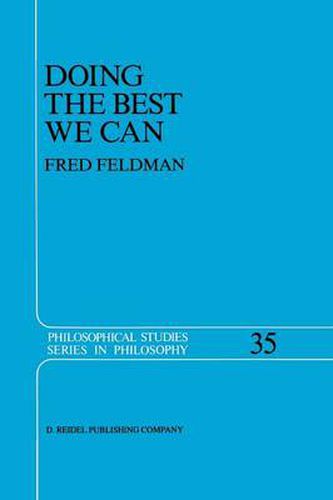Readings Newsletter
Become a Readings Member to make your shopping experience even easier.
Sign in or sign up for free!
You’re not far away from qualifying for FREE standard shipping within Australia
You’ve qualified for FREE standard shipping within Australia
The cart is loading…






This title is printed to order. This book may have been self-published. If so, we cannot guarantee the quality of the content. In the main most books will have gone through the editing process however some may not. We therefore suggest that you be aware of this before ordering this book. If in doubt check either the author or publisher’s details as we are unable to accept any returns unless they are faulty. Please contact us if you have any questions.
Several years ago I came across a marvelous little paper in which Hector-Neri Castaneda shows that standard versions of act utilitarian l ism are formally incoherent. I was intrigued by his argument. It had long seemed to me that I had a firm grasp on act utilitarianism. Indeed, it had often seemed to me that it was the clearest and most attractive of normative theories. Yet here was a simple and relatively uncontrover sial argument that showed, with only some trivial assumptions, that the doctrine is virtually unintelligible. The gist of Castaneda’s argument is this: suppose we understand act utilitarianism to be the view that an act is obligatory if and only if its utility exceeds that of each alternative. Suppose it is obligatory for a certain person to perform an act with two parts - we can call it ‘A & B’. Then, obviously enough, it is also obligatory for this person to perform the parts, A and B. If act utilitarianism were true, we appar ently could infer that the utility of A & B is higher than that of A, and higher than that of B (because A & B is obligatory, and the other acts are alternatives to A & B).
$9.00 standard shipping within Australia
FREE standard shipping within Australia for orders over $100.00
Express & International shipping calculated at checkout
This title is printed to order. This book may have been self-published. If so, we cannot guarantee the quality of the content. In the main most books will have gone through the editing process however some may not. We therefore suggest that you be aware of this before ordering this book. If in doubt check either the author or publisher’s details as we are unable to accept any returns unless they are faulty. Please contact us if you have any questions.
Several years ago I came across a marvelous little paper in which Hector-Neri Castaneda shows that standard versions of act utilitarian l ism are formally incoherent. I was intrigued by his argument. It had long seemed to me that I had a firm grasp on act utilitarianism. Indeed, it had often seemed to me that it was the clearest and most attractive of normative theories. Yet here was a simple and relatively uncontrover sial argument that showed, with only some trivial assumptions, that the doctrine is virtually unintelligible. The gist of Castaneda’s argument is this: suppose we understand act utilitarianism to be the view that an act is obligatory if and only if its utility exceeds that of each alternative. Suppose it is obligatory for a certain person to perform an act with two parts - we can call it ‘A & B’. Then, obviously enough, it is also obligatory for this person to perform the parts, A and B. If act utilitarianism were true, we appar ently could infer that the utility of A & B is higher than that of A, and higher than that of B (because A & B is obligatory, and the other acts are alternatives to A & B).